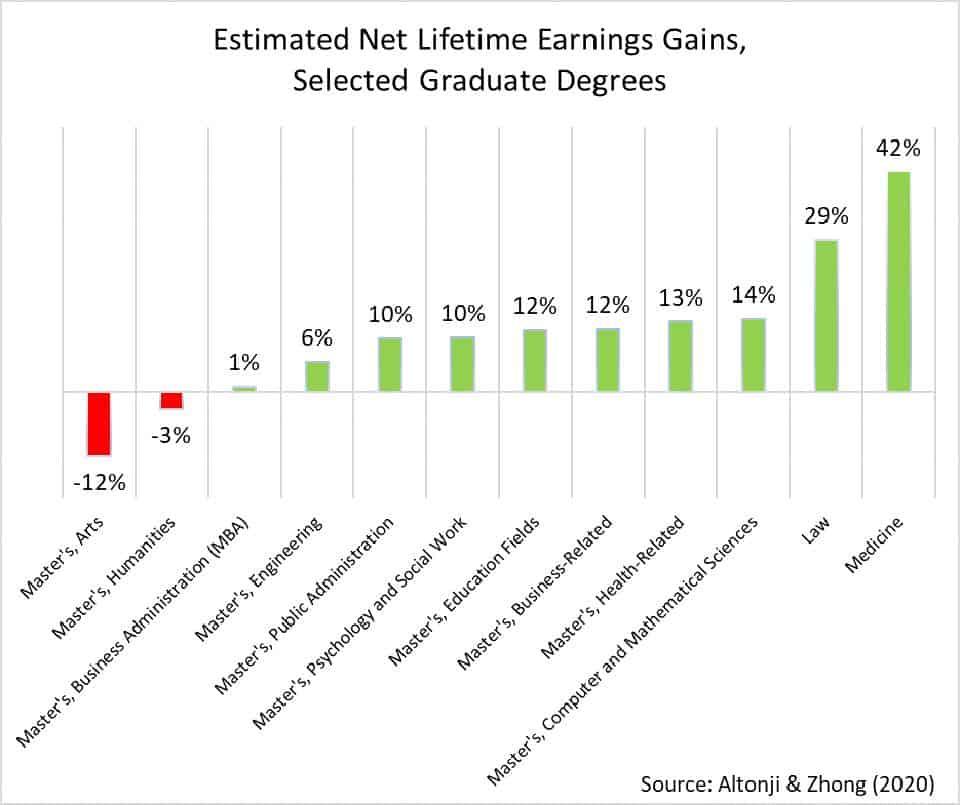Should You Get a Graduate Degree? Likely Not, Say Career Experts
Our readers always come first
The content on DollarSprout includes links to our advertising partners. When you read our content and click on one of our partners’ links, and then decide to complete an offer — whether it’s downloading an app, opening an account, or some other action — we may earn a commission from that advertiser, at no extra cost to you.
Our ultimate goal is to educate and inform, not lure you into signing up for certain offers. Compensation from our partners may impact what products we cover and where they appear on the site, but does not have any impact on the objectivity of our reviews or advice.
Most people pursue grad school because they want to grow professionally, land their dream job, and make more money. But grad school comes with a significant time and money investment. Here's how to decide if it’s the right path for you.

Most people pursue graduate school because they want to grow professionally, land their dream job, and make more money.
But sometimes it’s more expensive than you realize or it may not come with the salary increase you anticipated. Earning a graduate degree comes with a significant time and money investment, so it’s important to consider the consequences before deciding if it’s the right path for you.
To that point, Georgetown University recently published a study that showed grad school isn’t always the best move[1]. In many fields, recent grad school employees earn less than employees with a bachelor’s degree and three years of work experience. If you think you’ll get a huge salary bump as soon as you receive your shiny advanced degree, it may not be the case.
An All Too Familiar Story
In 2006, Andy Hill made $28,000 per year and had a lot of expenses. His mortgage and bills took up about 50% of his income. He had a lease on a Volkswagen Jetta and loved to spend money on the weekends. After he heard that an MBA would skyrocket his career and increase his earnings, he decided to pursue one.
Almost six years of night school later, Andy had an MBA with a concentration in marketing. Although he landed a Senior Sales Director position with a hefty salary, he doesn’t believe the MBA contributed to his success.
“If anything, my MBA was a nice line item and talking point on my resume, but it rarely came up during any interviews for jobs or any reviews during my time as an employee,” Hill said.
While his classes were interesting, Hill is confident that he could’ve received a better education by reading a few books about business and marketing and by networking with experts in his field.
When a Graduate Degree Is a Bad Idea
Going to grad school might seem like a mature decision, and it may look impressive on your resume. But there are some instances where it just doesn’t make sense.
1. You don’t know what you want to do.
If you’re unsure of your career path, grad school isn’t the answer. Matt Erhard, Managing Partner at Summit Search Group, said a lot of people enroll in a grad program right after earning their bachelor’s degree because they don’t know what else to do.
“If you’re just going to grad school to delay your job hunt a couple years, you may be making a very expensive mistake,” Erhard said.
Advanced degrees should be tools to further your career, not journeys of self-discovery.
A great way to figure out which career is right for you is to spend some time in the job market exploring different positions and industries. You can also reach out to people working in those industries on LinkedIn and talk to them about what their jobs are actually like. You can always go back to school once your career goals are more solidified.
2. You believe it will give you a better job.
Many people opt for grad school because they’re unhappy with their jobs. They think that an advanced degree will magically give them a better job with a six-figure salary.
Carlota Zee, a career coach with a graduate degree, said that adding extra letters after your name doesn’t mean an amazing job will fall into your lap. If your goal is to land a better job, her advice is to network.
“If you hated networking before you got a graduate degree, you’ll hate it afterward. But now you’ll be up to your neck in debt and you won’t have the luxury of choice,” Zee said.
Even if you’re not a fan of networking, it’s time to step out of your comfort zone and learn how to do it. Become active on LinkedIn, join professional organizations in your industry, and tell people you’re looking for a new job. Networking, not grad school, is often the key to professional success.
Related: 29 Flexible Work-From-Home Job Opportunities
3. Your industry values experience over education.
Bill Bailey, Director at the Center for Career and Professional Development at Clarion University of Pennsylvania, said there are some industries that place more value on experience than education.
For example, if you choose a field like computer engineering or marketing, work experience will usually be more important than a Master’s degree. If you’re unsure what your industry prefers, talk to some mid to senior level professionals. Find out if they went to grad school and whether they believe it helped their careers.
Gene Caballero, founder of GreenPal, discovered that work experience would’ve been more beneficial to his career than his MBA.
“After countless interviews, no potential employer was impressed by my MBA and actually questioned my lack of experience,” he said.
Related: 4 Things I Learned from Paying Off $30,000 in College Debt
When a Graduate Degree Is a Good Idea
Even though Hill doesn’t believe his MBA was worth it, there are some instances where a graduate degree might make sense.
1. You need a graduate degree to work in your field of choice.

In some professions, graduate degrees are a necessity. For example, if you want to become a clinical psychologist, you’ll need more than a bachelor’s degree. Grad school is also a requirement for other careers including being a professor, physical therapist, or a speech-language pathologist.
On the other hand, a bachelor’s degree will suffice if you want to work in engineering. Fo Alexander earned a Master’s degree in Engineering Management from Duke University to secure a better engineering job.
“The only ‘advantage’ of my graduate degree was that I was able to start off at a salary $10,000 higher than my peers,” he said. “But the degree cost me $54,000 for one year, so it was definitely not worth it.”
Alexander said it was the network from his undergraduate institution that helped him secure his first job, not where he got his Master’s degree.
2. You want to change your career.
Sometimes the career you picked in college doesn’t work out. Maybe you’re burned out or want a job with more flexibility or higher pay. Regardless of the reason, you may have to go to graduate school to change your career.
“If you’ve been working as a nurse but now want to be an accountant, you’ll need to pursue a master’s degree in accounting or an MBA with an accounting focus,” said Dr. Karen Gurney, CEO of Hire-a-Headhunter.
In some situations, a graduate degree isn’t necessary to make a career change. If this is true for you, Dr. Gurney recommends you get some relevant work experience under your belt, even if you have to take a pay cut. The pay cut will likely cost less than the cost of a degree and help get your foot in the door.
3. You earn a scholarship, assistantship, or tuition reimbursement.
While the cost of a graduate degree depends on the school and specific program, it will probably come with a high price tag. According to research from New America, the average graduate school borrower has $57,000 in student loans[2].
That’s a lot of money to come up with on your own, especially if you already have undergraduate loans, a mortgage, car payments, and other expenses. But if you’re able to land a scholarship, assistantship, or tuition reimbursement, grad school may be a good choice.
“A graduate degree makes sense if you can get someone else to pay for it, namely, your employer,” said David Bakke, College Expert at DollarSanity. “If an assistance program is available, then go for it.”
Related: Should Parents Pay for Their Children’s College Education?
Grad School Doesn’t Guarantee Success
In a perfect world, you’d go to grad school and instantly land a high-paying job you love. But grad school isn’t always a stepping stone to success. Unless you’re committed to a certain path that requires the degree or are very intentional about why you want it, a graduate education probably isn’t worth it.
If you want to further your career and increase your earning potential, talk to people currently working in the industry and ask them what they recommend. Knowing the right people can save you a lot of time and money because they can provide guidance, introduce you to more people, and keep you apprised of new positions.
You may still need to educate yourself. Take online courses or webinars. Attend conferences and informational sessions. Make learning and gaining new skills a regular part of your life. That’s the real way to success.







